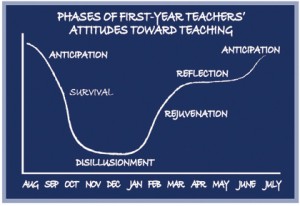Over the past few weeks, I’ve been working with a group of student teachers and a few new relief (substitute / casual) teachers, and been given ample opportunity to reflect on my early career experiences. I still have vivid (painful) memories of my student teaching practical experiences, and remember how I graduated from university in 2008 with high hopes and a completely unrealistic sense of my readiness to teach.
It is hard for my current colleagues to believe that the eccentric relief teacher that they see now was the epitome of the ‘angry young man’ just a few short years ago. Nevertheless, it’s true. It took me years to accept that my university had not properly prepared me for the profession, and that teaching was a much harder, more savage profession than I’d ever imagined.
This is my fifth year ‘on the road’, although I’m only just entering my fourth year of teaching (in terms of days worked). I’ve yet to have a class of my own, despite spending three months in a school (an unpleasant story with unexpectedly positive outcomes). It has been an interesting journey, but despite all the setbacks and disappointments, I’m actually a better person for it. And besides, with most graduates quitting within three years, I’m one of the survivors.
I’ve come a long way
I am a different person, a different teacher than I was just a few short years ago.
It has taken me over four years to feel competent, to feel like that I actually know what I’m doing. Yes, I make my mistakes, but I’m making fewer of them … Yes, I still struggle to manage some classes, but I have a better classroom management toolkit and approach to help me get through the difficult situations. And perhaps most importantly, with an extensive national and international education network, I no longer feel angry, isolated, and alone.
So, as I reflect on my pre-service and early career teaching experiences, I found myself mentally composing the advice I wish I’d been given all those years ago. For those of you about to graduate your teacher training, and those starting out in our profession, this is for you.
First Year Teaching is Hell Hard.

cc licensed ( BY NC ND ) flickr photo shared by wakingphotolife:
Please don’t enter this profession with rose coloured glasses. Please don’t expect to easily get a teaching position in a good school, in a good class. Don’t expect to be the perfect, well organised competent classroom teacher from Day One …
Teaching is not an easy profession, and your first year will be, to put it mildly, hard slog. It is a matter of survival, resilience, and perseverance. The meetings, the dealings with parents (who can be difficult), the planning, the extracurricular activities, the classroom management challenges … and the list goes on.
It is easy to be disillusioned, isolated, and alone as a new teacher, particularly when you’re a relief teacher or new graduate in a ‘horror’ class. Research shows that virtually all new teachers go through a process of survival, disillusionment, and rejuvenation, although some people take longer to go through a phase than others.
(Image source: http://www.weac.org/professional_resources/new_teacher_resources/beg_handbook/phases.aspx. BTW, I highly recommend the Survival Guide at this link)
As a relief teacher, I didn’t have the support network that most new teachers have when they’re posted to a school. I was lucky that I had a few schools which were willing to forgive my horrific management mistakes, and give me the teaching experience I so desperately needed.
I am indebted to those relief coordinators who gave me a chance to learn and improve, who didn’t ‘spit me out’ after one or two days in their school. I went through some very traumatic experiences, yet I was one of the luckier ones, as I wasn’t stuck in a horrible class or supportive school for my first year of teaching.
It isn’t really possible to adequately prepare for the challenges of first year teaching, but there are some strategies and resources you can access to help ease the transition.
Develop your PLN / support network BEFORE you graduate from your teacher training course!

cc licensed ( BY NC SA ) flickr photo shared by Alec Couros
If I could go back in time and change one thing about my university teacher training, I would have started building my online support network as a first year teacher. In fact, I’d go so far as to suggest teacher trainers should provide some information about online education networks and support communities as part of the first year teacher curriculum and graduate teacher programmes, as this would make a significant difference for many early career teachers.
My online support network has helped make me the teacher I am today. From providing emotional support behind the scenes through some of the most traumatic episodes of my career, to giving me the empowering chance to present at my first online conference, and to the ongoing collaboration that I contribute to, my online network has stood by me, and helped me grow over the past few years.
And remember, if you’re employed in a school community, don’t forget to develop your local support network as well. You’re not expected to know everything (although we often think we should), and don’t be afraid to ask your colleagues (teacher next door) for help and advice. Asking for help is not a sign of weakness, as you can’t survive in this profession if you try to go it alone. You’re working to create a learning community in your classroom and school, so don’t be afraid to practice what you preach!
Engage in State/Union Graduate Teacher Professional Development opportunities.
In Western Australia, I was lucky enough to be one of the few relief teachers to progress through the Education Department’s teacher induction programme. It is called different things in different states (see here for details) and different countries, but early career mentoring and professional development programmes are truly invaluable. You’d be truly mad not to participate if you’re eligible, and I was certainly glad I did so.
Try and maintain your health
This is vitally important, and something that I probably should have paid more attention to in my first few years. Eating healthily, aiming for regular exercise, and maintaining an outdoor hobby are critical to surviving first year teaching.
I must confess that while I became a skilled ballroom dancer during this time (it was my only social outlet), ignoring chronic stress-related health problems saw me end up in hospital. I know for a fact that I wasn’t the only first year teacher who went through this experience, and I can only stress that setting some time aside to look after yourself, however hard, is critical when you’re starting out in this very stressful, and time-consuming profession.
Document the Journey
As you progress in your career, there will be times where you will want to look back, and see how you thought and acted in your early years. In fact, I’m doing that now …
A private journal or blog is an essential medium for first year teachers. Believe it or not, it really, really helps to just take a moment to write down what you are doing, how you are feeling, and what you’re planning to work on. In my first year, I took a few hours each school holidays to sit and write, and what I wrote makes for interesting, if admittedly painful, reading.
In more recent years, this blog has replaced my journal, although I have always maintained a separation between the raw emotion of the journals & the more professional tone I use here. I’m not sure I could have publicly blogged my first year experiences, although I do know, and greatly respect those teachers who do so.
Keep hold of your dreams, passions, and reasons for entering teaching.
Each person comes into teaching for different reasons, and there will be times in your early career where you’d will be wondering if it is all worth it, whether you’re actually achieving anything, or making a difference.
Don’t let go of your dreams, find something to cling on to – through the good and the bad. If you’re lucky enough to discover a passion for something, hold on to it with both hands. Having a sense of purpose and direction makes a huge difference when you’re going through the rough times, and will help you stay in what is, at the end of the day, a wonderful profession.
Remember, you’re never alone. And you ARE making a difference.
Enjoy the ride
First year teaching will be a challenge, but it is just the beginning of what we hope will turn out to be an amazing journey. As I enter my fourth year of teaching, the painful memories and traumatic experiences have faded, replaced by the triumphs, successes, and positive learning experiences of the past two years.
They say “what doesn’t kill you, makes you stronger”, and that seems to have defined my teaching journey. For all the highs and lows, I’m a better person, and a better teacher. I’m looking forward to an exciting future in my chosen profession, and can’t wait to discover where it will take me.
Yes, I may not have (yet) had my own class, or a school to truly call home. Yet, I’m a teacher, and I’m proud of it.
All that remains is to wish my student-teacher and first year colleagues ‘good luck’ for your future. You have the potential to become great teachers, and I look forward to working with you in the years to come. Welcome to teaching.

Thanks MG
I have been through the disillusionment cycle a couple of times this year already – my first year of teaching. I know that it is normal but there is still that sense of frustration (much like the frustration I see in my students when THEY are doggedly trying to get something right, but haven’t quite got there yet).
Knowing I’m not the first lonely / naive beginning teacher is heartening in itself.
@akoaroha
Hi Carolyn 🙂 Thanks for leaving a comment – it actually vindicates my decision to go ahead and publish the post.
I think the fact that you are actually out there on Twitter, and reading blogs is already a good sign for the future. Yes, your first year isn’t and won’t be easy, but you’re NOT alone. And if you ever need a hand, just drop us a line 🙂
Regards
Michael